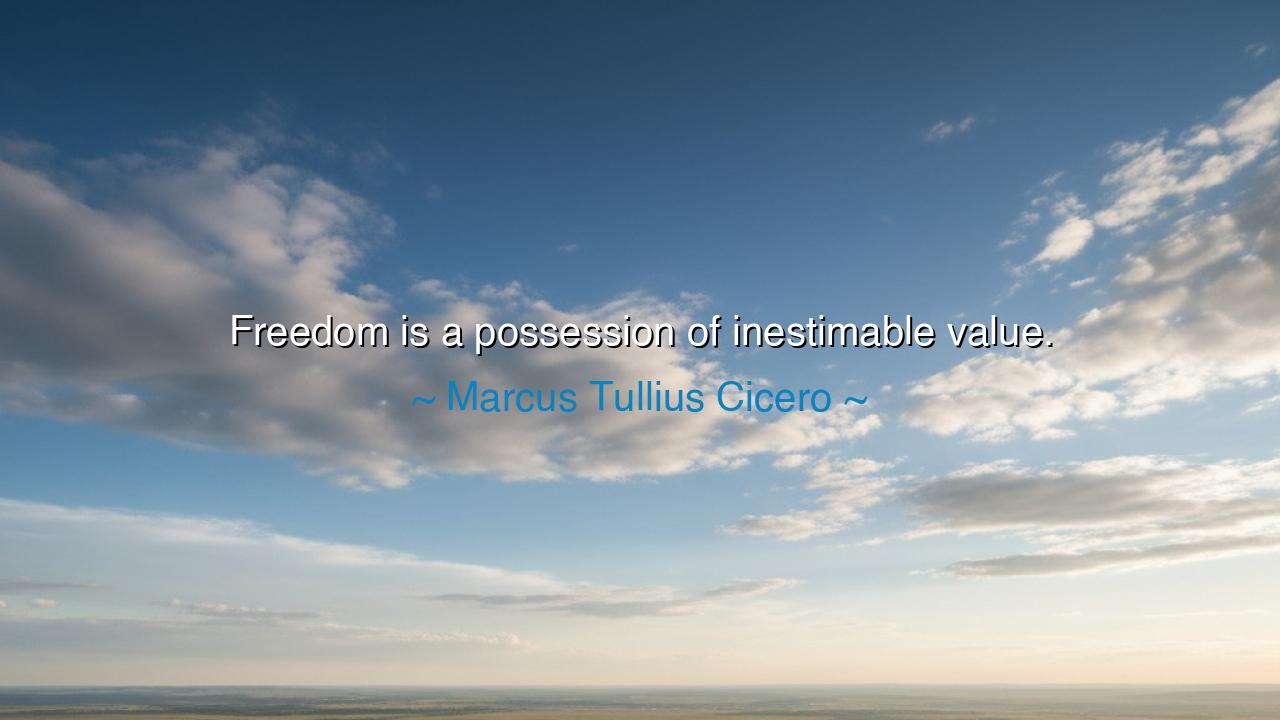
Freedom is a possession of inestimable value.






Host: The courtyard of the old university was deserted. The late evening sun slanted through the arches, gilding the cobblestones with that amber light that makes history feel alive. A flag stirred gently above the clocktower — the faint sound of wind and bells echoing through the quiet.
Jack sat on the stone steps, coat open, a worn book of philosophy in his hand — the cover creased, the edges frayed. He wasn’t reading it so much as holding it, as if the weight of words alone could anchor him. Jeeny stood a few paces away, leaning against a pillar, her scarf trailing in the breeze, her gaze fixed on the horizon.
The air smelled faintly of rain, of leaves and distance — the kind of scent that always precedes reflection.
Jeeny: softly, her voice breaking the silence “Marcus Tullius Cicero once said, ‘Freedom is a possession of inestimable value.’”
Jack: without looking up “Possession. That’s the word that catches me.”
Jeeny: raising an eyebrow “You don’t think freedom can be possessed?”
Jack: closing the book slowly “Not really. You can’t own something that disappears the moment you stop fighting for it.”
Host: The wind picked up, scattering dry leaves across the courtyard. One landed on the open page of Jack’s book, like punctuation written by nature itself.
Jeeny: “Cicero was talking about Rome, about tyranny. For him, freedom was the foundation of civilization — a civic treasure, not a personal indulgence.”
Jack: looking at her now, quietly “Maybe that’s what makes it so valuable. You don’t measure freedom by what you get to do. You measure it by what you protect for others.”
Jeeny: nodding slowly “And yet most people use it like currency — spending it only when it benefits them.”
Jack: smirking “The irony of liberty: everyone loves the word, few accept the responsibility.”
Host: The light shifted, the courtyard turning gold to bronze. The ancient statues along the wall seemed to watch them — stone philosophers presiding over a conversation humanity keeps repeating.
Jeeny: “Do you think we’ve forgotten what freedom means?”
Jack: quietly “No. We’ve just confused it with comfort.”
Jeeny: curious “How so?”
Jack: leaning forward, voice low and deliberate “Freedom demands discomfort. It means choice, consequence, disagreement, risk. But people don’t want that. They want safety dressed up as liberty.”
Jeeny: “You mean we traded danger for convenience?”
Jack: nodding “And called it progress.”
Host: The clocktower bell tolled once, deep and resonant. Jeeny’s hair caught the light as she turned to face him fully.
Jeeny: softly “You sound like Cicero himself.”
Jack: grinning faintly “He got killed for saying things like that, remember?”
Jeeny: smiling sadly “So did everyone who reminded the world that freedom is fragile.”
Host: The sun dipped lower, casting their long shadows against the ancient stones. The conversation deepened, the way twilight deepens — slowly, beautifully, inevitably.
Jeeny: “What about personal freedom, though? The kind that’s not political. The freedom to be, to think, to feel without asking permission.”
Jack: thoughtful “That’s the hardest one to keep. Because it’s not stolen — it’s surrendered. Bit by bit, for approval, for security, for belonging.”
Jeeny: “We trade authenticity for acceptance.”
Jack: “Exactly. And then call it maturity.”
Host: The wind paused, and the world seemed to hold its breath. A bird’s cry echoed from the high towers — sharp, fleeting, alive.
Jeeny: quietly “You think Cicero would recognize us today?”
Jack: after a long pause “He’d recognize the fear. The fear of speaking freely. The fear of being wrong. The fear of standing alone.”
Jeeny: softly “But he’d also recognize the hope — that freedom still tempts us, still burns in us, even when we forget its cost.”
Jack: smiling faintly “Yeah. Maybe that’s what he meant by ‘inestimable value.’ It’s not priceless because it’s rare. It’s priceless because it’s never truly ours.”
Jeeny: “You can’t buy it. You can only live it.”
Host: The first stars appeared — faint pinpricks of light above the silhouette of the old clocktower. The night arrived not like an ending, but like a quiet understanding.
Jeeny sat beside him on the steps, her shoulder brushing his. The book lay open between them, Cicero’s name illuminated by the last light of dusk.
Jeeny: softly “You ever wonder if freedom is less about escape and more about integrity?”
Jack: looking at her “Meaning?”
Jeeny: “Meaning — maybe freedom isn’t doing whatever you want. Maybe it’s having the strength to be who you are, even when the world disapproves.”
Jack: after a beat “That’s the kind that outlives empires.”
Host: They sat in silence, the evening breathing around them. The air cooled, the light dimmed, but the conversation lingered — as if freedom itself had stopped to listen.
Jack: quietly, almost to himself “You know, every generation thinks it invented freedom. But really, it just discovers again what it costs.”
Jeeny: softly “And who’s willing to pay for it.”
Host: The camera pulled back, the two of them small against the expanse of the old courtyard — two modern souls speaking an ancient truth under the Roman scholar’s shadow.
And as the world folded into night, Cicero’s wisdom drifted like a whisper through time:
Freedom cannot be inherited — it must be chosen, daily.
It is not comfort, but courage.
Not ownership, but responsibility.
And though the cost is high, its worth is beyond measure —
because in choosing freedom, we remember what it means to be human.






AAdministratorAdministrator
Welcome, honored guests. Please leave a comment, we will respond soon